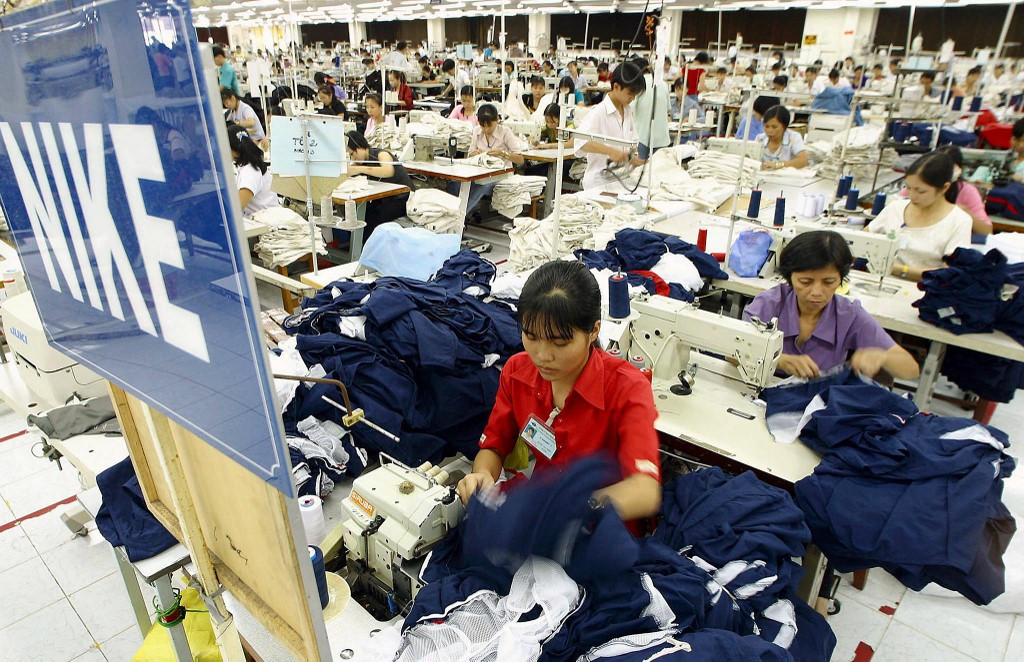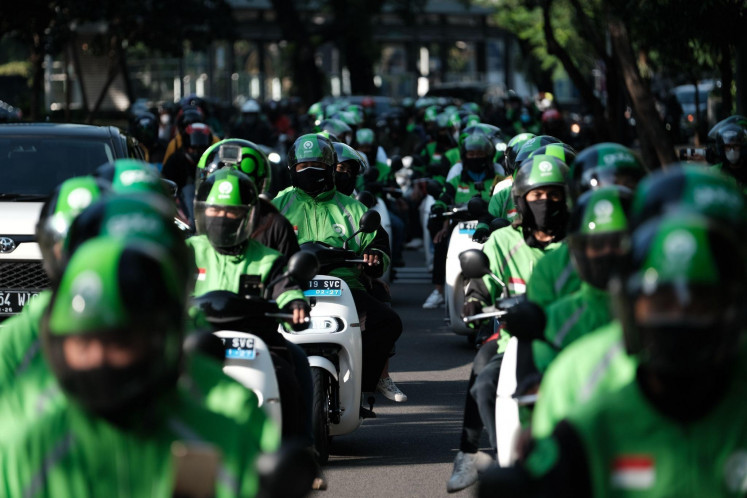Popular Reads
Top Results
Can't find what you're looking for?
View all search resultsPopular Reads
Top Results
Can't find what you're looking for?
View all search resultsUS tariffs on Vietnam would be a blow to Nike and other sportswear brands
Nike is one of several sportswear brands heavily reliant on Vietnam as a production site and higher tariffs would force the company to absorb higher costs or hike its prices at a time when it is already discounting some items to clear inventory.
Change text size
Gift Premium Articles
to Anyone
N
ike could soon face another blow in its effort to revive its brand and reverse a long decline in sales: US tariffs on imports from Vietnam.
On Wednesday, US President Donald Trump is expected to announce which countries and products he will target with a new round of tariffs aimed at encouraging domestic production and coaxing other nations to buy more US goods.
Vietnam, which runs a $123.5 billion trade surplus with the United States, is a prime target.
Nike is one of several sportswear brands heavily reliant on Vietnam as a production site and higher tariffs would force the company to absorb higher costs or hike its prices at a time when it is already discounting some items to clear inventory.
Nike produced 50 percent of its footwear and 28 percent of its apparel in Vietnam in its 2024 financial year, according to its annual report. Rival Adidas is slightly less exposed, relying on Vietnam for 39 percent of its footwear and 18 percent of its apparel.
The average US tariff rate on footwear from Vietnam is 13.6 percent, while the rate on apparel is 18.8 percent, according to calculations based on January trade data made by Sheng Lu, professor of fashion and apparel studies at the University of Delaware.
"If tariffs are extended there, then Nike's got a problem," said Morningstar analyst David Swartz.
Nike and Adidas are hardly alone. Vietnam has become a hub for high-tech running shoes, sportswear, and outdoor apparel as brands have sought to reduce exposure to China.
Lululemon, Columbia Sportswear and Amer Sports, which owns Salomon and Arc'Teryx, count Vietnam as their top manufacturing country.
But the potential tariffs come at a critical moment for Nike, which has lost market share of late to competitors viewed as fresher and more innovative, like On and Hoka.
In a quarterly earnings call last month, Chief Financial Officer Matt Friend said Nike's revenue was expected to continue to fall next quarter.
That outlook factored in current tariffs, said Mari Shor, senior equities analyst with Columbia Threadneedle Investments, which holds Nike shares. "But what if it gets worse?"
Industry braces for impact
Some smaller, younger sportswear brands are even more exposed to Vietnam. Fast-growing running brand On in 2024 sourced 90 percent of its shoes and 60 percent of its apparel and accessories from the country.
On shoes are already expensive, selling for $130 to $330 a pair, and Samuel Wenger, the brand's chief operating officer, said tariffs were among the factors On considers when deciding on price. "Our premium brand gives us the ability to adapt our pricing thoughtfully," he told Reuters.
Average US prices of sneakers have already risen by 25 percent since 2019, partly because of rising production costs, said Beth Goldstein, footwear industry analyst at market research firm Circana.
While US sales of running shoes have risen 16 percent to $7.4 billion since 2021, according to Circana's Consumer Tracking Service, US consumer confidence recently hit a four-year low, suggesting more price increases could prove hard to swallow.
Moving production out of Vietnam is no simple matter. Other Southeast Asian countries, such as Cambodia and Indonesia, could face tariffs too, and production costs are already rising there.
Factories in Cambodia are charging 5 percent to 10 percent more as they get more orders from retailers looking to shift production from China or Vietnam, said Michael Yee, CEO at apparel and accessories sourcing company MGF Sourcing in Hong Kong.
Nike, Adidas and Amer Sports declined to comment on questions about Vietnam tariffs. Lululemon and Columbia Sportswear did not reply to Reuters requests for comment.
The good news, say experts, is that tariffs on imports from Vietnam - particularly for apparel - are unlikely to be as steep as those in China.
Leaders in Hanoi have taken several steps to stay in Trump's good graces, promising more imports from the US, lower duties, and allowing Starlink - the satellite company owned by Trump adviser Elon Musk - to offer its internet services in the country.
The Trump Organization, meanwhile, is partnering with Vietnam on potential investments in hotel, real estate and golf course projects possibly worth billions of dollars.
"Vietnam has proven its ability to play the geopolitical game very skillfully," said T. Rowe Price portfolio manager Johannes Loefstrand, who runs a Frontier Markets Equity strategy weighted towards Vietnam stocks.
Wilbur Ross, who served as commerce secretary in Trump's first administration, said the president had generally good ties with Vietnam and had no reason to hit it hard with tariffs that would be felt on main street.
"People notice the cost of apparel because they buy it fairly frequently," Ross told Reuters.











